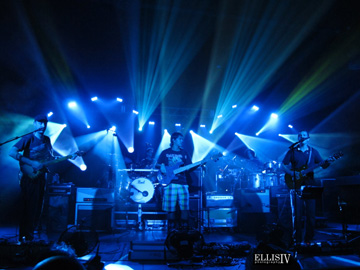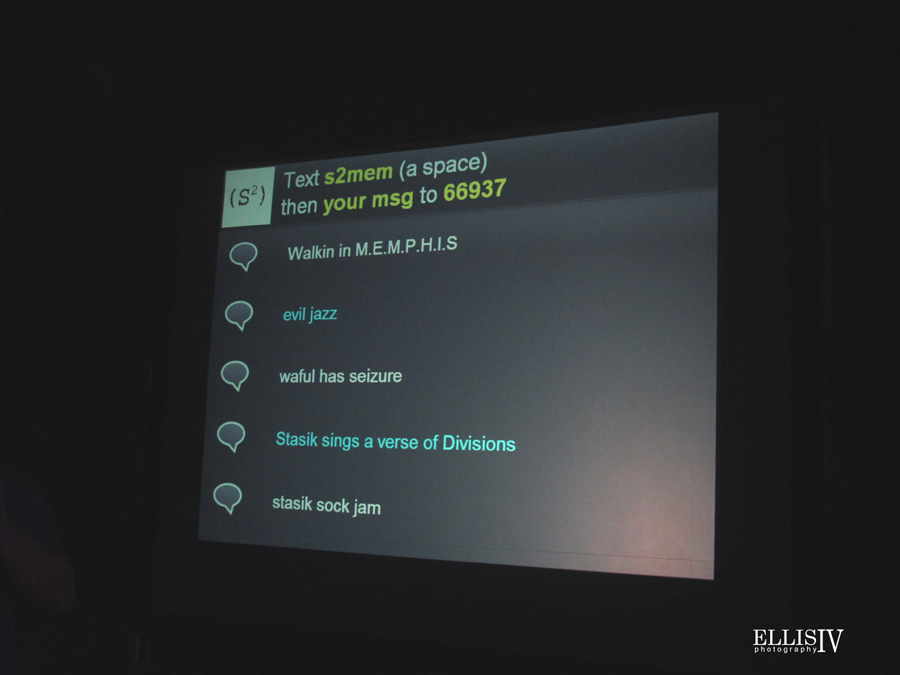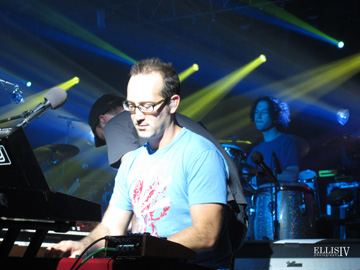
Photos by Ellis Jones
Stew Art Series and Show
Umphrey’s McGee is always searching for new avenues to connect with fans. Its Stew Art Series accomplishes this goal like no other prior effort. It mixes technology and the group’s uncanny ability to improvise with fifty fanatics who literally dictate what the band will play and when. This is achieved by a large overhead screen and text messages. Stew Art attendees send their requests and once they appears on the screen, the band is left to accommodate. Needless to say this leads to an extraordinary few hours for all parties involved. There also are question and answer segments and a meet-and-greet at the end.

On the first set began, the initial text appeared on the screen, “All Things Glory” and it did not take long for the band’s sound to fill the pristine Minglewood Hall. Ryan Stasik’s deep bass lines along with percussionist Andy Farag and Kris Myers hammering away on the drums created the structure for the acrobatics. As soon as the band got comfortable, a new request appeared. The fans kept things interesting with a lot of mash-up messages, reminiscent of Umphrey’s Halloween shows where they fuse two songs together. Paul Simon’s “Graceland” danced with “Honey Sugar Darling,” as did the Who’s “Eminence Front” paired with Umphrey’s own “Front Porch.” Once in awhile they would glance up at the screen with a confused look, but this sentiment never manifested itself in the music.
There were plenty of light-hearted moments as well. One being Ryan Stasik forced to sing verses of the classic “Divisions,” nobody enjoying it more than the rest of his band mates. After an evil jazz segment (and it was just that), the band’s cover of Marc Cohn’s “Walking in Memphis” was done so well you would have thought they rehearsed it. As the small crowd was treated to one forgotten classic after another, we were all floating on a collective cloud. After an insane vocal jam, the music portion ended on my favorite two notes. “Don’t Stop ‘Till You Get a [Puff]”, a spoof of Michael Jackson’s classic, was followed by “Tribute to Isaac Hayes’ Shaft,” with all members of the band getting a chance to strut their stuff Memphis-style.
This was followed by pizza with the band. They waited in line and made time to talk to everybody – it felt good to be appreciated by them. It felt even better that there was still a complete show ahead.

After ducking into a bar door for a couple of hours it was time to head back to Minglewood for part two. The Hall was buzzing with anticipation, and where there once stood fifty, it was now a packed house. With the boys more than warmed up, they opened the first set with a blistering “Andy’s Last Beer.” Jeff Waful, one of the best lighting designers in the business had the lights dancing on cue. It astonishes me that with music so diverse and unpredictable, he never misses a chance to dazzle. With the crowd dancing to the resonant sound, the band slipped into “Intentions Clear.” Nobody playing today intertwines songs quite like Umphrey’s McGee. Their transitions are as tight as any orchestra and they can change sounds on a dime. Brendan Bayliss’ unique approach to the guitar is the glue that binds all the contrasting styles each member brings to the music. After a little over an hour, the set ended with “2nd Self,” giving way to a well-needed break.
“Wappy Stayberry” kicked off the second set with Joel Cummins tearing up the keys, and he was seemingly in a trance-like state all night. As the captivated crowd danced to “Tribute to The Spinal Shaft,” I was bewildered by the effort of these six musicians, having heard the song turned upside down just hours ago. This tune bled into my highlight of the night in the form of Pink Floyd’s “Comfortably Numb.” The vocals by Brandon and fellow guitarist Jake Cininger were as perfect as the song choice, for many of us were feeling just that. The rest of the show saw electronica jams transform to full out metal with the ease of a chord change. “Ms. Tinkle’s Overture” was a fitting second set closer, as on this evening, Umphrey’s had seemingly conducted their way through every style of music.


No Comments comments associated with this post